The COVID-19 pandemic challenged and tested all members of the Washington University School of Medicine community, with many responding to the crisis with remarkable resilience and commitment.
The newly announced 2023 Dean’s Impact Awards recognize 48 faculty members across the School of Medicine, six of whom are from the Department of Anesthesiology, for their exceptional efforts that had a lasting impact. These awards celebrate those who demonstrated the highest level of professionalism and delivered impressive results in all the school’s missions. While all individuals at the School of Medicine deserve recognition for their dedication during the pandemic, these awards specifically acknowledge the outstanding contributions made by certain faculty members in navigating challenges during these unprecedented times.
“We are immensely proud of the roles played by our faculty and staff during the height of the COVID-19 pandemic,” says Michael S. Avidan, MBBCh, FCASA, head of the Department of Anesthesiology. “While we recognize the heroic efforts of every member in our community, we are especially grateful to the recipients of the Dean’s Impact Awards for their unwavering dedication.”
Prior to the 2023 Dean’s Impact Awards, the department also acknowledged members of our community with COVETED Awards in 2021. These were bestowed on staff members, clinicians, scientists, educators, and trainees, who made outstanding contributions during the peak of the pandemic.
Congratulations to the department’s faculty members who have been honored with Dean’s Impact Awards in 2023.
The following award recipients will be recognized during a ceremony on May 17, 2023:
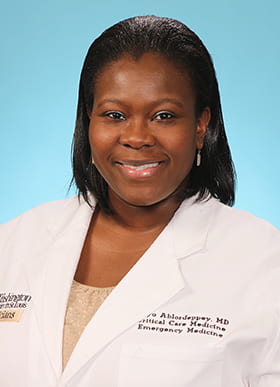
Enyo A. Ablordeppey, MD, MPH, FACEP, FCCM
Associate Professor of Anesthesiology and of Emergency Medicine
Associate Vice Chair for Diversity, Equity, and Inclusion
Following her appointment as the co-director of the 7800 Intensive Care Unit (ICU) in 2020, Enyo A. Ablordeppey, MD, MPH, played a seminal role as a clinician caring for some of the sickest patients with COVID-19 while also providing institutional leadership during this most challenging time. Her clinical excellence and contributions as an intensive care physician during the pandemic were recognized nationally by her peers when she was appointed as a fellow of critical care medicine in 2020. Throughout the pandemic, Ablordeppey continued to prioritize being a dedicated and exemplary educator. Apart from her educational prowess at the School of Medicine, she also served as a guest professor for the Acute Care Nurse Practitioner Program at the Goldfarb School of Nursing. Throughout her career, she has been a beloved educator among trainees and students, and she served as director of our Critical Care Ultrasound Training Program. Ablordeppey has won numerous educational awards, including for her inspiring teaching despite the pressures imposed on her by COVID-19. After a national search, in 2021 Ablordeppey was selected as the inaugural associate vice chair for diversity, equity and inclusion (DEI) in the Department of Anesthesiology. In addition to her other roles, she prioritizes this important work, which was made all the more urgent and salient with the impacts of COVID-19 on our society and our institutions.
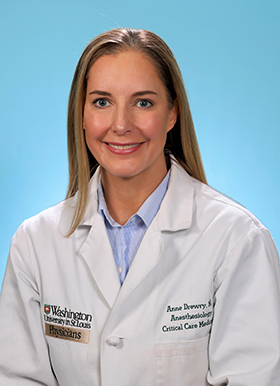
Anne M. Drewry, MD
Associate Professor of Anesthesiology and of Critical Care Medicine
Vice Chair, Department of Anesthesiology
Chief, Division of Critical Care
Anne Drewry, MD, displayed extraordinary leadership and innovative excellence during the COVID-19 pandemic. In 2021, Drewry was appointed as vice chair of anesthesiology in acknowledgement of her many accomplishments, and in recognition of her compassionate, steadfast response to the pandemic. As division director, she directed the critical care clinical activities of several BJC HealthCare community hospitals as well as the surgical and cardiothoracic intensive care units (ICUs) at Barnes-Jewish Hospital. In response to the influx of critically ill patients, she helped expand the ICU footprint within BJC by 40% by arranging for additional midlevel and physician ICU coverage as well as helping to convert non-ICU spaces into functional ICU space. In addition, Drewry chaired the BJC COVID-19 Taskforce to help coordinate the critical care response to COVID-19 and standardize care and resources across the system ICUs. She was instrumental in coordinating the tele-critical care response to the pandemic, facilitating the collaboration between the tele-ICU and BJC Transfer Center to help place patients in the hospitals most appropriate for their conditions. Early in the pandemic, she increased staffing of the tele-ICU to remotely care for patients and allow other services/consultants to remotely access patients through the tele-ICU audiovisual connections. While addressing staffing challenges, she prioritized the well-being of the APPs, residents and physicians in the division during an extremely stressful period for critical care clinicians. Drewry was awarded a COVETED award in 2021 for her outstanding contributions to the community, her peers and the Department of Anesthesiology during the pandemic.
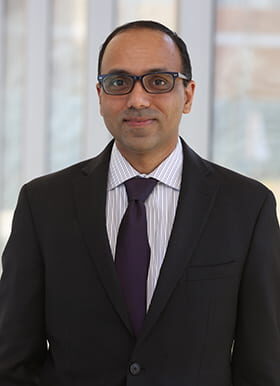
Thomas G. Kannampallil, PhD
Associate Professor of Anesthesiology
Associate Professor of Computer Science and Engineering, School of Engineering and Applied Science
Director, Acute Care Innovation Research
Associate Chief Research Information Officer, School of Medicine
Thomas Kannampallil, PhD, was named the inaugural director of acute care innovative research following an extensive search in 2022. He used his expertise in systems management and research by leading the development of an institutional and regional data warehouse that aggregated comprehensive clinical data on COVID-19 patients; this data warehouse, in addition to being the central resource for several published studies (>25) and day-to-day operational decision making, was the basis for the institution’s data sharing efforts for national registries such as N3C (National COVID Cohort Collaborative). During the early phase of the pandemic, Kannampallil was able to translate efforts into three large R01 grants. These grants were focused on developing informatics-inspired solutions to address the grand challenges facing the health care community — addressing the acute challenges associated with clinician wellness and turnover, integrating and streamlining telemedicine practice and its implications for care outcomes, and EHR-integrated behavioral interventions for managing the physical and mental health of older adults. Kannampallil’s contributions in research and systems leadership continue to have long lasting effects on the department and the future of large-scale, multi-institutional “touchless trials.”
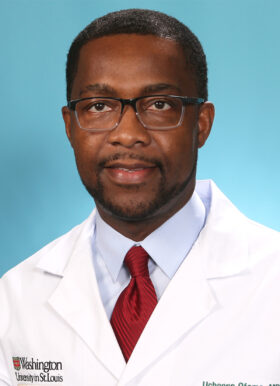
Uchenna R. Ofoma, MD, MS
Associate Professor of Anesthesiology
Uchenna Ofoma, MD, MS, was appointed as the director of Christian Hospital Intensive Care Unit (ICU) in 2020 when the critical care needs of the community were mounting greater each day due to COVID-19. The timing of his appointment was critical, and he rose to the occasion when he joined his colleagues in the frontline trenches, taking care of some of the most critically ill patients with COVID-19. He lead the helm of critical care through revamping hospital operations to optimize capabilities — working to increase the hospital’s ICU bed capacity to more than twice its original size, expanding the ICU physician and advanced practice provider workforce to three times its original size, and optimizing the availability of scarce resources such as ventilators. With the acceleration of virtual care, Ofoma leveraged telemedicine ICU capabilities to take care of COVID-19 patients outside of the ICU at Christian Hospital. Ofoma’s efforts helped to build organizational and staffing resilience throughout the pandemic. Aside from his formidable work in clinical leadership during the pandemic, Ofoma took the time to also become a PIA SAFE champion to address the societal impacts of COVID-19. This role required 10 weeks of training to become a trusted resource and ally for his colleagues where he provides support and guidance to his peers experiencing conflicts, microaggressions or negative behaviors. As a health services researcher, he focused his research on understanding national telemedicine critical care capacity, which has been shown during COVID-19 to be critically important for planning for future pandemics or other disruptions to health care delivery.
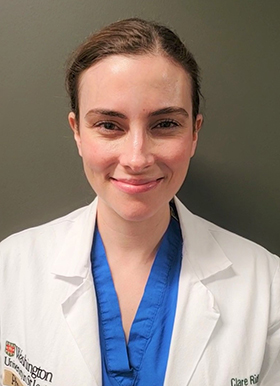
Clare H. Ridley, MD
Assistant Professor of Anesthesiology and of Surgery
As the COVID-19 pandemic unfolded in 2020, Clare H. Ridley, MD, was appointed as the director of the Surgical COVID Intensive Care Unit (ICU) in the 8200 ICU in recognition of her excellent clinical leadership. Under this appointment, she has played a vital role in collaborating with the hospital and ICU nursing leadership to ensure an outstanding quality of care to critically ill patients, including many impacted by COVID-19. Despite increasing demands brought on by the pandemic, she continued to exceed expectations as the director of heart and lung transplant anesthesiology and as associate medical director of the CTICU. Throughout her career, Ridley has shown initiative in ensuring a culture of diversity, equity and inclusion — challenges that have been made all the more vital due to the impacts of COVID-19. Through her work as a PIA SAFE champion, Ridley underwent 10 weeks of training to become a trusted resource and ally for her colleagues. In this role, she provides support and guidance to her peers experiencing conflicts, microaggressions or negative behaviors. She also conducts meaningful research with a focus on teamwork training and safety outcomes in the CT operating rooms.
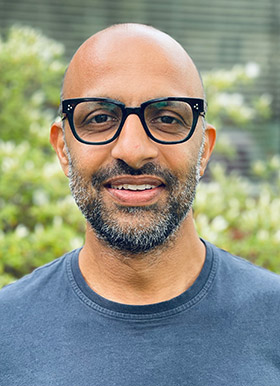
Pratik Sinha, MD, PhD
Assistant Professor of Anesthesiology
Pratik Sinha, MD, PhD, joined the Department of Anesthesiology at the height of the COVID-19 pandemic in 2020, entering the Division of Critical Care and Division of Clinical and Translational Research. In assuming this vital role, Sinha applied his clinical expertise to care for patients in the surgical and cardiothoracic intensive care units (ICUs). He was able to leverage his prior experience in veno-venous ECMO to care for the high-throughput and unprecedented number of patients being offered this service at Barnes-Jewish Hospital. In collaboration with his colleagues in the cardiothoracic ICU, Sinha led the way to rapidly iterate and innovate best practice as data in the field emerged. Simultaneously, Sinha established a federally funded research program investigating precision medicine in sepsis and acute respiratory distress syndrome, resulting in several landmark publications. With a shift in the health care climate, he pivoted his research group to study COVID-19. He has published numerous studies evaluating the heterogeneity of COVID-19 and challenging the several unsubstantiated and unscientific dogmas that became rapidly entrenched during the pandemic. His research efforts have resulted in over 35 peer-reviewed manuscript publications. With demands on his clinical and research skill set, Sinha still found capacity to mentor several fellows, junior faculty, doctoral scholars and undergraduates. In 2021, he was recognized for his contributions to outstanding patient care, research and mentorship when he was awarded a COVETED award for contributions during the pandemic.
These individuals displayed extraordinary work during the COVID-19 pandemic. They inspire and motivate their colleagues every day, and we are so lucky to have them as part of our team.
Michael Avidan, MBBCh, FCASA, head of the Department of Anesthesiology